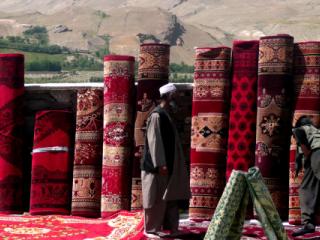Anna Badkhen spent a year in the remote Afghan village of Oqa. She got to know the master weavers, who make some of the world's most beautiful carpets.More
Politics and History
In the midst of chaos in her home country, Humaira Ghilzai recently sat down with Charles Monroe-Kane to talk about what might be lost culturally as the Taliban take power.More
In her book, "Against White Feminism," Pakistani Rafia Zakaria argues that white American feminists prolonged the bloodshed during the 20 year war in Afghanistan. She asks if these feminists ever asked Afghan women of the region what they wanted.More
Science writer Deborah Blum on the government scientists who made the case for food regulation by "eating dangerously."More
Tyrone Muhammad, also known as "Muhammad the Mortician," is the funeral director at Newark’s Peace and Glory Home for Funerals. He spent decades trying to stop the epidemic of gun violence in the black community he serves, but nothing prepared him for a pandemic.More
David Shields says the New York Times is complicit in romanticizing war through imagery.More
Is war inevitable? Leymah Gbowee loudly and strongly says no. And she’s got proof.More
James Nachtwey is one of the world's great war photographers. For more than three decades, he's covered just about every major armed conflict around the world, and he's been wounded several times on the job. He talks about his harrowing work in Afghanistan, Iraq and where those wars began — Ground Zero in 2001.More
Alissa Quart spent the last few years traveling around the country, talking with all kinds of people about work. What she found is a lot of people with jobs that look good on paper but who feel — in a word — squeezed.More
When we talk about reforming work, fixing work, creating new kinds of work — author and historian James Livingston thinks perhaps we’re not going far enough. More
Nineteenth century European explorer David Livingstone died of malaria nearly 150 years ago, but as author Petina Gappah explains, Africans are still debating his legacy today as they assess the impact of European colonialism.More
Feeling regret about committing a crime matters in criminal sentencing. But if emotion isn't supposed to have a place in the law, should it matter? Susan Bandes tells us how judges and juries evaluate remorse, and why.More
On Native American reservations, high school basketball is huge. They have developed a fast-paced style of play called “rez ball.” New York Times reporter Michael Powell spent a season covering the team from Chinle High School in the Navajo Nation.More
The 1968 Olympic games changed everything for John Carlos. He and fellow runner Tommie Smith raised their fists in the Black Power salute on the podium in a moment that became known as the most defiant and controversial in Olympics history.More
Ghanaian post-colonial theorist Ato Quayson thinks a lot about globalization, diaspora and transnationalism. Because he’s a literary scholar, he decided to "read" a single street — Oxford Street in Accra — as a study of contemporary urban Africa.More
Historian Emily Calacci says the massive migration into African cities isn't following the Western model of urban development. Instead of an infrastructure of roads, railways and electric grids, many African cities rely on "people as infrastructure."More
Why does it seem like we always head into Monday feeling let down? Journalist Katrina Onstad explains how we ruined the weekend, and how to get it back.
More
In one recent study, 50 percent of people surveyed said they often or always feel exhausted from work. Emma Seppala says that it’s because collectively, we’re falling for outdated ideas about success.More

















